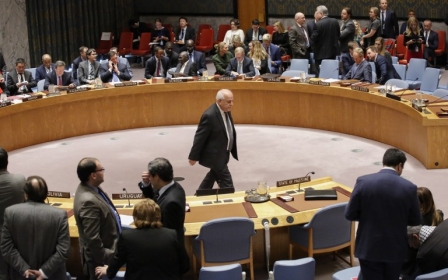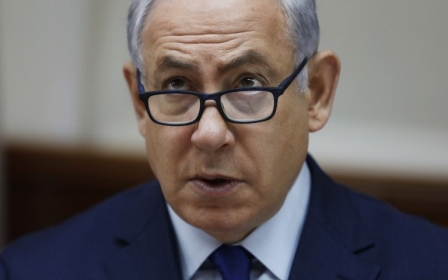A history of UN General Assembly resolutions on Israel-Palestine

Since the creation of the UN on 24 October 1945, the General Assembly has passed scores of resolutions pertaining to Israel-Palestine - arguably to little effect.
With yet another vote in the assembly scheduled today - this time over whether to condemn the US decision to move their embassy to Jerusalem - here are a few of the most important votes taken in the assembly over the longstanding crisis:
Resolution 181: The partition of the British Mandate of Palestine (29 November 1947)
By far the vote with the most lasting impact, at the same time the failure to implement Resolution 181 in its totality has underscored all the problems in the region ever since.
The resolution recommended that the British-controlled territory of Palestine be divided into two states, one for Arabs and one for Jews with a special international status for Jerusalem.
The Jewish Agency, representing Jewish Zionists in Palestine, reluctantly accepted the plan established by the resolution, but the Arab League rejected it and the fallout was a military confrontation that led to the expulsion and flight of more than 750,000 Palestinians from their ancestral homeland and the establishment of the State of Israel.
The General Assembly vote was also contentious - 33 countries voted in favour, while 13 (primarily Arab and Muslim) voted against. Ten countries, including the UK, abstained.
Speaking in the assembly, Iraq's foreign minister Fadel Jamall warned that the partition would harm Jewish-Arab relations in the Middle East.
"There are more Jews in the Arab world outside of Palestine than there are in Palestine. In Iraq alone, we have about one hundred and fifty thousand Jews who share with Muslims and Christians all the advantages of political and economic rights," he said.
"Harmony prevails among Muslims, Christians and Jews. But any injustice imposed upon the Arabs of Palestine will disturb the harmony among Jews and non-Jews in Iraq; it will breed inter-religious prejudice and hatred."
Following the establishment of Israel, hundreds of thousands of Jews were expelled or left Arab lands and travelled to the newborn state.
Resolution 2253: Condemnations of Israel's measures to change the status of Jerusalem (4 July 1967)
Following the Six-Day war, Israeli forces captured East Jerusalem, the West Bank, the Gaza Strip, the Golan Heights and the Sinai Peninsula.
Though Sinai was eventually returned to Egypt, the occupation of these territories has remained the dominant issue in the Israel-Palestine conflict.
Resolution 2253 saw the first UN condemnation of attempts by Israel to claim sovereignty over the holy city. Although the motion was unanimous (99 in favour, with 20 abstentions) in calling for Israel to "rescind all measures already taken and to desist forthwith from taking action which would alter the status of Jerusalem", it did nothing to prevent Israel formally annexing the city in 1980.
The capture of East Jerusalem and the structure known as the Temple Mount to Jews and the Haram al-Sharif to Muslims has led to repeated conflicts over the status of the holy site.
Shortly after the site's capture, the Israeli army chaplain Rabbi Shlomo Goren urged then Central Command head General Uzi Narkiss to dynamite the Dome of the Rock under the cover of war telling him “do this and you will go down in history".
The construction of the third temple on the Temple Mount has long been a dream of religious Zionists and while Narkiss at the time threatened to imprison Goren for suggesting it, the threats against the Muslim holy buildings have repeatedly provoked outrage and clashes.
Resolution 3379: Recognising Zionism as a form of racism (10 November 1975)
One of the most controversial resolutions adopted by the body, Resolution 3379, accepted the principle that Zionism as an ideology was inherently racist and comparable with both the apartheid government in South Africa and the white-minority government in Rhodesia (now Zimbabwe).
Israel responded with fury to the resolution and cited the distribution of the anti-Semitic forgery The Protocols of the Elders of Zion by Arab states as proof of the hypocrisy of the movers of the resolution.
"For us, the Jewish people, this resolution based on hatred, falsehood and arrogance, is devoid of any moral or legal value," said Israeli ambassador Chaim Herzog, who tore the written resolution in half at the end of his speech.
"For us, the Jewish people, this is no more than a piece of paper and we shall treat it as such."
The resolution passed with 72 states supporting and 35 against, while 32 abstained. The resolution opened up a debate on the nature of Zionism - opponents argued that the ideology of European Jews establishing a Jewish state in the middle of the Arab world was by nature racist and colonialist, while others argued that it represented the national liberation movement of the Jewish people.
Regardless, the resolution was revoked in 1991 after Israel made revocation a pre-condition of its taking part in the Madrid conference that year.
Resolution 4321: The First Intifada (3 November 1988)
On 8 December 1987, an Israeli army truck ran into a group of Palestinians near the Jabalya refugee camp in Gaza, leaving four dead. The incident proved to be a catalyst for a mass uprising against Israeli rule that put the status of Palestinians living in the occupied territories in the global spotlight.
Resolution 4321 reiterated earlier demands for Israel to withdraw from the occupied territories and called on international powers to provide aid and solidarity to Palestinians living under occupation.
The resolution condemned Israel's "persistent policies and practices violating the human rights of the Palestinian people in the occupied Palestinian territories, including Jerusalem, and, in particular, such acts as the opening of fire by the Israeli army and settlers that result in the killing and wounding of defenceless civilians", as well as a litany of other abuses.
The intifada eventually led to the opening up of dialogue between the Israelis and the Palestine Liberation Organisation (PLO) and the establishment of the Palestinian Authority through the Oslo accords - a move which has been both celebrated and condemned in equal measure.
Resolution 6719: Recognition of Palestine as an observer state (29 November 2012)
November 2012 saw the General Assembly recognising Palestine as a non-member observer state. Although the vote was largely symbolic - Palestine was now on the same level as the Holy See - it allowed the Palestinian Authority access to the International Criminal Court, which raised the possibility that Israeli officials could end up facing charges of war crimes.
Speaking during the vote - which passed 138 to 9, with 41 abstentions - PA President Mahmoud Abbas called on delegates to "to issue a birth certificate of the reality of the State of Palestine."
Israeli and American officials condemned the motion as unilateral and argued it violated the spirit of the Oslo accords. However, the acceptance by large parts of the world of the existence of a State of Palestine signified the changing global attitude to the question of Palestine in the like of repeated wars and continuing intransigence on the part of Israel.
"Life will not be the same [because] Palestine will become a country under occupation," said Palestinian negotiator Saeb Erekat after the vote.
"The terms of reference for any negotiations become withdrawal."
New MEE newsletter: Jerusalem Dispatch
Sign up to get the latest insights and analysis on Israel-Palestine, alongside Turkey Unpacked and other MEE newsletters
Middle East Eye delivers independent and unrivalled coverage and analysis of the Middle East, North Africa and beyond. To learn more about republishing this content and the associated fees, please fill out this form. More about MEE can be found here.






